13 Best SEO Competitive Analysis Tools (2024 Comparison)
If you want to outrank the competition in Google, it helps to know what your opponents are up to. That’s where SEO competitor analysis tools come in.
In this post, we’ll be comparing 14 of the best SEO competitor analysis tools on the market this year. All the platforms below provide you with the tools you need to analyze your competitors’ SEO performance.
You can use them to find out where they’re ranking for their target keywords, who’s linking to them, which of their pages are driving the most traffic, and much more.
The best SEO competitive analysis tools – summary
TL;DR:
- SE Ranking – Best SEO competitor analysis tool for most users. Great balance of affordability and features. Includes a large database of keywords and backlinks.
- Semrush – Best for SEO professionals, larger teams, and enterprise customers. Includes 40+ different tools, a large database of backlinks, and keywords. And they have their own version of Similar Web.
- Brand24 – Best for real-time monitoring of competitors.
- Frase – Best for developing and optimizing content based on your search competitors.
#1 – SE Ranking
SE Ranking is best known as a rank tracker but it has one of the biggest databases of backlinks and keywords for competitor research purposes. In my tests, it picked up more keywords for my site than Ahrefs, by a significant margin.
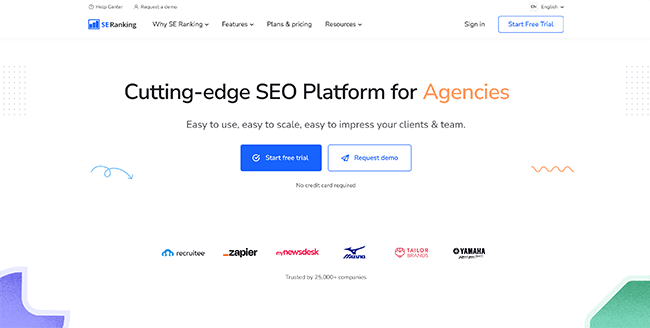
The user interface is very straightforward to use. Just navigate to the Competitive Research tab and type in your domain to get started.
Next, scroll down to your Organic competitors list to see a breakdown of all the websites that compete with you for ranked keywords, ordered by their visibility.
You can click on any of these competitors to open up their website in the same Competitive Research report. From there, you’ll be able to see a ton of insights about their SEO and PPC performance. At a glance, you can see an estimation of their monthly organic and paid traffic, the total value of that traffic, and the number of keywords they rank for.
You’ll also see their Domain Trust and Page Trust metrics so you know how authoritative their site is (and whether or not you can compete).
Below that, you’ll see graphs that display their traffic, keywords, and backlink growth over time, as well as traffic distribution by country.
Further down, you’ll find a list of all their most valuable keywords, alongside their search volume, organic ranking position, CPC, etc.
If you want to see the keywords they rank for in a specific region, you can change the settings to pull data from a specific country or continent (or just leave it as Worldwide).
And that’s just the basic stuff. If you want to, you can dig even deeper and analyze ranking changes over time, SERP features, top pages by traffic share, etc.
Switch to the Backlink Checker tab to analyze your competitors’ backlink profiles. You can pull up a detailed report of all their backlinks in minutes, alongside the referring domains and web pages they originate from.
You can filter the referring domains by Domain Rank (a measure of website authority) in order to find their most valuable backlinks, then add them to your own link-building prospect list.
Aside from competitive research, you can also use SE Ranking to conduct a website audit, optimize on-page content, find keyword suggestions, track your rankings, and a lot more.
Pros and cons
| Pros | Cons |
| All-in-one SEO solution | Pricing system can be confusing |
| Great UI | |
| Huge databases | |
| Affordable | |
| Great option for agencies that want to control costs |
Pricing
SE Ranking uses a flexible, scalable pricing system with plans starting from $23.52/month.
The cost of your plan is calculated based on your rankings check frequency, subscription period, the number of keywords you need to track, and the specific plan you sign up for.
Read our SE Ranking review.
#2 – Semrush
Semrush is an enterprise-level SEO software solution. It’s the best competitive analysis tool for large teams, enterprise customers, and anyone who’s serious about SEO.
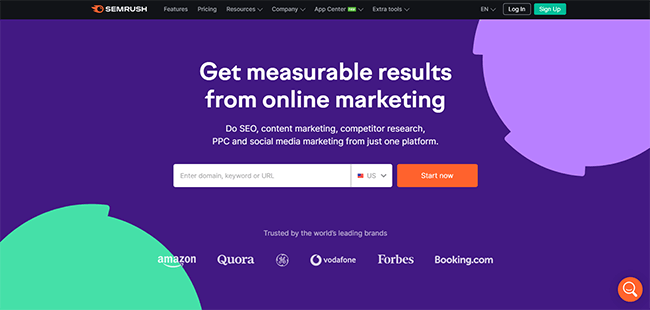
Semrush is a true all-in-one marketing platform. It comes with over 40 different tools to help with all areas of your marketing campaigns, including SEO, PPC, SMM, and content marketing.
The built-in competitor analysis toolkit is split into four distinct tools: Organic Research, Advertising Research, Social Media Tracker, and Traffic Analytics. Combined, these tools put all the data you need to get a complete, 360-degree insight into your competitor’s digital marketing strategy.
The Organic Research feature shows you the keywords your competitors are ranking for and how valuable they are. There’s also a nifty ‘keyword gaps’ tool that lets you compare multiple competitors at once to discover gaps in their SEO strategy (valuable keywords that they’ve overlooked.
The Advertising Research feature gives you the insights you need to beat your rivals in paid search. Unpick their PPC strategy and analyze their ad copy.
The Social Media Tracker makes it easy to find what is working for you across your main social media profiles. A social media scheduling tool is also included.
The Traffic Analytics feature is Semrush’s answer to Similarweb. It enables you to gather deep insights into your competitors’ websites, including their total monthly traffic, traffic sources, bounce rate, time on page, etc. You can then benchmark your own performance against these stats. This is a paid add-on but if you want to go beyond just analyzing organic search traffic, it’s well worth it.
Pros and cons
| Pros | Cons |
| Largest keyword database | Expensive |
| Enterprise-level features | Lots of features make the UI a little messy |
| Huge number of SEO tools | |
| Useful traffic analytics feature (alternative to Similarweb) | |
| Generous usage limits, particularly for their organic research tools |
Pricing
Plans start at $129.95/month. A limited free account and free trial are both available. Traffic Analytics is available as part of the Trends add-on for an extra fee.
Read our Semrush review.
#3 – Serpstat
Serpstat is another powerful all-in-one SEO platform with integrated competitive research features. It has an extensive database of backlinks and keywords and offers great value for money.

Like SE Ranking, the easiest way to get started is to enter your own website URL into their domain analysis tool, and then view your Competitors report to find out who your biggest SEO opponents are.
Once you’ve found your competitors, you can run a report on their domain instead to start analyzing their SEO performance. You can see all the important data at a glance, including traffic estimations, ranked keywords (alongside their ranking positions), etc.
From there, you can open up a more complete Keywords report to find more information about the search terms they rank for. Use filters to sort through them and identify the best opportunities.
Another neat feature we liked is the Domain vs Domain tool. It lets you compare several competitor websites at once to see who has the most SEO visibility.
Pros and cons
| Pros | Cons |
| Easy to use | Backlink database not as large as other tools |
| Great value for money | |
| All-in-one SEO solution | |
| Compare multiple domains simultaneously |
Pricing
You can get started with a free Serpstat account (limited access). Paid plans start at $45/month.
#4 – Brand24
Brand24 is great for monitoring competitor mentions across the entire web. You can use it in creative ways to find guest post and other link opportunities.
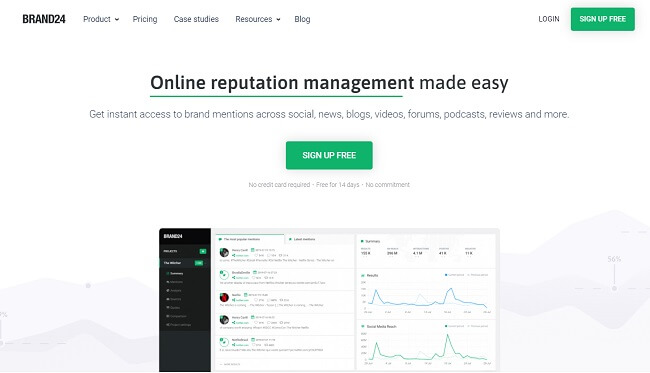
Brand24 is what’s known as a media monitoring tool. It automatically crawls the web and ‘listens in’ on conversations across social media, in blog posts, and elsewhere on the web.
You can use it to track mentions of any keyword—including your competitor’s brand name. Once you set it up, Brand24 will monitor all brand mentions of your competitors, analyze brand sentiment based on the context of those mentions, and provide you with a wealth of other insights.
You can also use it to track your own brand mentions. That way, you can be notified whenever someone says something negative about your brand online so you can respond quickly and mitigate damage to your reputation.
Pros and cons
| Pros | Cons |
| Monitor competitor brand mentions | No competitive keyword research tool |
| Discover your competitors’ brand ambassadors | No backlink analysis |
| Identify their strengths and weaknesses based | |
| Analyze their brand sentiment |
Pricing
Plans start from $49/month (billed annually). A free trial is available.
Read our Brand24 review.
#5 – Frase
Frase is an SEO content optimizer and AI-powered writing assistant. You can use it to develop and optimize content based on your search competitors.
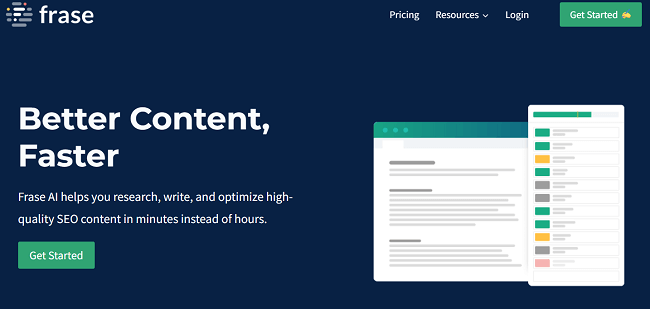
Here’s how it works. First, you tell Frase the keyword you want to target. Then, Frase will analyze the content that’s already ranking for that keyword on Google and use those insights to curate an SEO-optimized brief in minutes.
This brief comes complete with headers, keywords, and sub-topics pulled from your SEO competitors’ content. Frase will let you know how to structure your article and tell you the related keywords that you should include to stand the best chance of ranking.
You can even use the AI-powered writing assistant to speed up your writing time. It’ll autocomplete sentences and paragraphs for you, and give you real-time suggestions and feedback to improve your work.
Pros and cons
| Pros | Cons |
| Speed up content planning, research, and writing of briefs | No backlink analysis |
| Optimize your content based on leading competitors. | Not an all-in-one solution |
| Real-time suggestions | |
| Autocomplete sentences and paragraphs | |
| GSC integration highlights opportunities within your existing content |
Pricing
Plans start at $14.99/month ($12/month billed annually). Start a 5-day trial for $1.
Read our Frase review.
#6 – SEO SpyGlass
SEO SpyGlass is a competitor analysis tool that’s included as part of the Link-Assistant SEO PowerSuite. The tool gives you access to a significant backlink index that can help you to learn about your competitors’ SEO strategies and find out more about their backlink profiles.
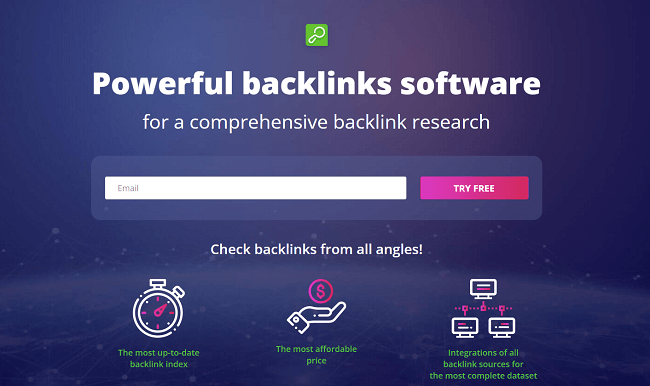
In addition to showing the linking domains, SEO SpyGlass will also provide analytics data like InLink Rank (a proprietary metric close to PageRank), HTTP status codes of the linking domains, link source, anchor text clouds, penalty risks, and more.
All of this information can help you to analyze and score the quality of each link.
And with the rest of the SEO PowerSuite software, you get access to a website auditor, rank tracking, keyword research, and more.
Pros and cons
| Pros | Cons |
| Free version + affordable paid plans | Download required |
| In-depth backlink data | No monthly payment option |
| Includes other useful SEO tools (website auditor, keyword research, and more) |
Pricing
There is a free standard version of SEO PowerSuite available to download. Paid packages start from $299/year.
#7 – Morningscore
Morningscore is one of the easiest SEO competitive analysis tools to use. It’s a fun, simple solution built for beginners.

Morningscore comes with all the features you’d expect from an SEO toolkit. You can use it to track your rankings and analyze competitor websites to discover their keywords and links, then use those insights to inform your own strategy.
What makes Morningscore different is its built-in gamification. Morningscore lets you know exactly how much each of your SEO tasks is worth in monetary figures.
You can then use the ‘Missions’ feature to manage all your SEO projects and prioritize them based on their profitability. Having clear goals and rewards to work towards helps you stay focused.
Pros and cons
| Pros | Cons |
| Built-in gamification | Not as many features/tools as other SEO solutions |
| Fun and simple interface | |
| Ideal for beginners | |
| Competitive keyword research & backlink analysis |
Pricing
Plans start at $65/month (or $650/year). You can try it out with a 14-day free trial.
#8 – SpyFu
SpyFu is another awesome competitive analysis tool. It’s great for both SEO and PPC research.

Like most tools on this list, SpyFu can help you to analyze and reverse engineer your competitors’ organic search strategy, with insights into their organic keywords, backlink, top-performing pages, etc.
But on top of that, it also comes with plenty of features for competitive PPC research. You can use it to spy on your competitors’ ad campaigns and analyze all their landing pages and ad copy.
I know what you’re thinking: This post is about SEO competitive analysis tools—so why would you be interested in PPC features? Well, the insights you draw from PPC analysis can complement your SEO strategy.
For example, SpyFu shows you both the organic keywords and the paid keywords your competitors are targeting. There’s no reason you can’t target the same keywords they’re paying to rank for in your SEO campaigns.
Pros and cons
| Pros | Cons |
| Great for PPC research | Higher learning curve than some options |
| Accurate keyword estimations | UI could be better |
| Good backlink database |
Pricing
Plans start at $33/month when billed annually (not including their current limited-time offer promotion).
#9 – WebCEO
WebCEO is an SEO and digital marketing toolkit that comes with 23 pro-level tools for keyword research, competitive analysis, site audits, backlink monitoring, etc.

You can use WebCEO to run an in-depth competitor analysis and uncover key competitor metrics. Get a full ranking report comparing their search visibility to yours, dig into their backlink profile, evaluate their traffic, see their social citations, and more.
WebCEO is a great choice for agency-level analysis thanks to its powerful reporting capabilities, lead generation tool, and white label feature.
Pros and cons
| Pros | Cons |
| In-depth competitor analysis | Expensive for multiple users |
| Six widgets to compare your website against your competitors | Some plans include additional scanning fees |
| Great for agencies | |
| Powerful reporting |
Pricing
Plans start at $33/month if paid annually. Try it out with a 14-day trial. Certain plans include additional scanning fees.
#10 – Moz Pro
Moz Pro is one of the most popular SEO and competitor analysis tools on the market. It features an extensive backlink database and tons of tools that can help you analyze your competitors.
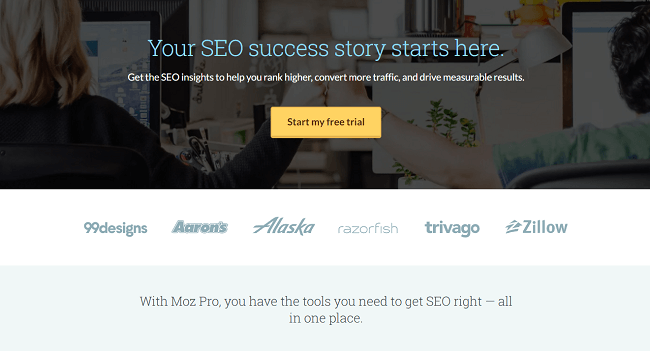
Using their industry-leading metrics DA (domain authority) and PA (page authority), you can analyze how well your competitors are performing and learn more about how to improve your own site ranking capabilities.
Moz’s expansive backlink database includes over 35.5 trillion backlinks, so you can gain a clear picture of your competitor’s backlink profile and use it to improve your own strategy.
Moz also includes a built-in on-page optimization tool that can help you to up your game when it comes to on-page SEO.
Pros and cons
| Pros | Cons |
| All-in-one SEO tool | No PPC features |
| Large backlink & keyword database | More expensive than some other options |
| Great propriety authority metrics | |
| Includes on-page SEO checker |
Pricing
Plans start from $79/month when billed annually.
#11 – Ahrefs
Ahrefs is a popular all-in-one SEO platform. It’s used by some of the biggest brands and is known for having the most active SEO crawler and some of the largest backlink and keyword databases. However, it’s extremely expensive compared to other tools.
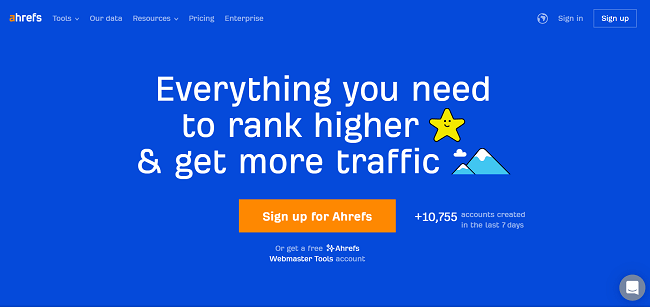
Ahrefs is a great toolkit—I can’t deny that. It’s long been considered to be the gold standard when it comes to SEO and competitive analysis, but in recent years, other platforms have started to catch up.
The reason I’ve listed it so far down this list is that Ahrefs has fallen out of favor recently due to their controversial billing changes. They recently changed their pricing system and started to bill overages automatically. And usage allowances have been cut significantly. We’re talking about 500 reports per month compared to Semrush offering thousands per day.
Ahrefs is a fantastic platform and I particularly like it’s keyword research tools but it offers the least value for money of any other platform I’ve tested.
Pros and cons
| Pros | Cons |
| Full-featured toolset | Monthly credits vary depending on plan. |
| Most active crawler | Automatic billing for overages |
| Huge, up-to-date databases | Expensive for rank tracking |
| Great user interface |
Pricing
Plans start at $83/month billed yearly. No free trial is available and Ahrefs bills extra for overages automatically.
#12 – Majestic
Majestic is an SEO backlink checker and link-building toolset that can help you gain insight into your own and your competitor’s backlink profile. The tool maps the web to provide link data to help you get the edge over your competitors.

The Link Explorer tool can be used to check backlinks for your own or your competitor’s sites. It provides in-depth data that shows you the number of links a site has, where they come from, and what category they fall into. It also provides useful data like link graphs, and link profiles that can help you and your clients to visualize and understand your backlink profile.
You can also use Majestic to gain insight into other metrics such as referring domains, anchor texts, related sites, and much more. Overall, it’s a must-have tool if you want to build a clear picture of your competitor’s backlink profile.
Pros and cons
| Pros | Cons |
| In-depth link analysis | Dated user interface |
| Advanced features | |
| Useful proprietary metrics such as Trust Flow. |
Pricing
Plans start from $41.67/month when billed annually. Only offer 7-day money-back guarantee
#13 – iSpionage
iSpionage is a competitive analysis tool that is specifically designed to help you uncover details of your competitor’s conversion strategy and steal their traffic.
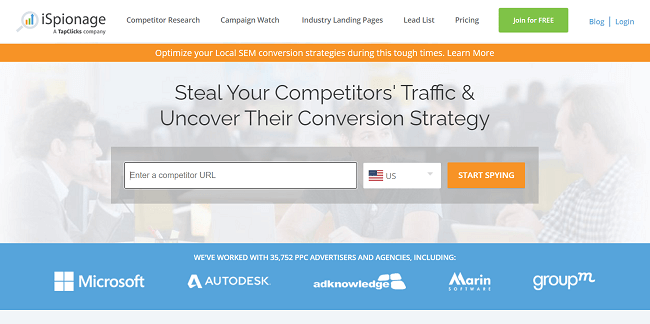
Using the tool, you can identify your top AdWords competitors and find out details about their PPC strategy and budget. You can also gain valuable insights into your competitor’s keywords and use the built-in Keyword Effectiveness Index (KEI) to identify the most profitable keywords with the highest search volumes for your campaigns.
In addition to this, iSpionage can also help you improve your click-through rate by identifying high-converting and profitable ad copy that your competitors are using.
iSpionage is an agency-level tool that can also be used to gain insight and learn more about the niches and verticals of your potential prospects.
You can use the tool to gain industry insights and details about your prospect’s competitors to flesh out your proposals and improve your chances of closing deals.
Pros and cons
| Pros | Cons |
| Useful keyword and PPC features | No free plan available |
| Good for agencies | Keyword tracking is limited in all plans |
| Competitor ad copy analysis features |
Pricing
Plans start from $50/month when billed annually and offer a 30-day money-back guarantee.
Wrapping it up
That concludes our comparison of the best SEO competitor analysis tools. All of the tools in this list have different strengths and weaknesses, and each has its place in your marketing strategy. But if you’re not sure which one to choose, here’s what we’d recommend:
- SE Ranking is the best choice for bloggers, entrepreneurs, and small business owners. It offers a great set of features and a large backlink and keyword database for an affordable price.
- Semrush is the best choice for agencies, large teams, serious SEO professionals, and enterprise customers. It’s the best of the best, with the most complete set of marketing tools and the largest databases, but it’s not cheap.
- Brand24 is the best solution to monitor competitor mentions across the web in real-time.
If you’re not sure which tool is right for you, check out the free trials offered by the above tools. Some tools also offer limited free plans.
Disclosure: If you buy through links on our site, we may make a commission. This helps to support the running of Startup Bonsai.
